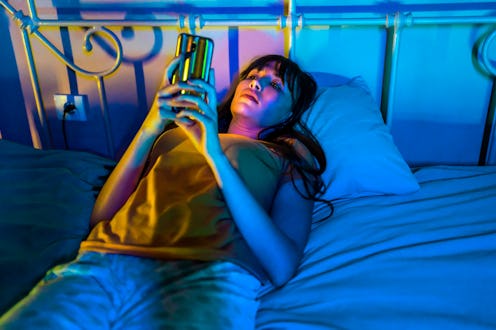Tech
How Watching TikTok Before Bed Affects Your Dreams
Not me sleeping in 4K…

Your nightly routine is honed to a tee: brush teeth, cleanse, tone, moisturize, put on your fave pajamas, lie in bed and watch TikToks till your eyes start to close involuntarily. Then, naturally, you spend the next eight hours with dreams that feel suspiciously influenced by the TikToks you just watched. If you’ve made TikTok part of your evening wind-down, you might find the scroll of hula hoop workouts relaxing as you’re drifting off, but it’s a little freaky to hear Megan Thee Stallion’s “Body” on a loop through your dreams.
Read more: What Do Dreams About Cats Mean? Here's What Experts Say
It’s notoriously hard to figure out the relationship between what happens in your waking hours and your dreams, but there are some clues about it. The more you think or worry about something when you’re awake, for instance, the more likely you’ll think about it while you’re sleeping. During the COVID pandemic, for example, a study in Frontiers in Psychology found nightmares and stress dreams became common, and dreams about people in trouble or diseases were particularly frequent. The things that are important or strike a chord in your waking hours may show up when you’re dozing off. And experts tell Bustle that can include your fave TikTokers.
TikTok Affects Your Dreams By Messing With Your Sleep Patterns
TikTok is designed to keep you scrolling even when you’re sleepy, neuropsychologist Sanam Hafeez Psy.D. tells Bustle, and that could affect how much rest you get. “We have an internal reward system, and when we get things we crave, our brain releases dopamine, allowing us to feel satisfaction and pleasure,” she says. Every time you keep scrolling through TikTok, your brain releases a little dopamine, creating a reward-seeking feedback loop that keeps you on the app way past your bedtime.
This dopamine loop could affect your dreams by depriving you of Zzzs. Researchers noted in The Conversation in 2020 that when people sleep less, they tend to dream more, and those dreams are more intense. Hafeez says that if you’re staying up on TikTok all night — and letting your phone’s bright lights confuse your circadian rhythms, which tell your body when to sleep and wake up — you’re likely to have sleep issues. Result? Extremely vivid dreams about Bunny the talking dog.
An Emotional TikTok Could Affect Your Dreams
TikTok isn’t just about entertainment. Queer TikTokers, for example, use the app to find community, going as far as to develop their own linguistic codes. If TikTok provides you with a kind of emotional support, it’s more likely it will affect your dreams. “One of the theories regarding the function of dreams is that dreaming permits the emotional content of experiences to be processed,” Dr. Guy Leschziner, M.D., consultant neurologist at London Bridge Hospital and clinical lead at Guy's Hospital Sleep Disorders Center, tells Bustle. Hence dreaming about breakups 10 years after the fact.
Strong emotional responses to TikToks could make them pop up during REM, Dr. Leschziner says. “Essentially, if you have experienced an event with very strong emotion associated with it, dreaming facilitates the deposition of the memory of that event,” he says. If you see a three-party storytime TikTok that makes you rethink your entire relationship with your mom, for example, you might dream about it while your brain processes it to file in your memory.
It’s also more likely that the TikToks you view today will make their way into your dreams tonight. According to a bunch of studies, including one published in Cognitive Neuroscience of Memory Consolidation in 2017, recent experiences are more likely to be dreamt about, but it’s most common if the incidents were “personally significant.” Thinking you might have ADHD because of TikTok? Expect that to show up when you’re snoozing.
So whether you’ve cried at a touching TikTok or stayed up all night scrolling through the “I’ll Never Forget You” trend, be prepared for the app to affect your dream life, too.
Experts:
Sanam Hafeez Psy.D.
Dr. Guy Leschziner M.D.
Studies:
Eichenlaub, J.-B., Cash, S. S., & Blagrove, M. (2017). Daily life experiences in dreams and sleep-dependent memory consolidation. In N. Axmacher & B. Rasch (Eds.), Cognitive neuroscience of memory consolidation (pp. 161–172). Springer International Publishing. https://doi.org/10.1007/978-3-319-45066-7_10
Eichenlaub, J. B., van Rijn, E., Gaskell, M. G., Lewis, P. A., Maby, E., Malinowski, J. E., Walker, M. P., Boy, F., & Blagrove, M. (2018). Incorporation of recent waking-life experiences in dreams correlates with frontal theta activity in REM sleep. Social cognitive and affective neuroscience, 13(6), 637–647. https://doi.org/10.1093/scan/nsy041
Pesonen, A. K., Lipsanen, J., Halonen, R., Elovainio, M., Sandman, N., Mäkelä, J. M., Antila, M., Béchard, D., Ollila, H. M., & Kuula, L. (2020). Pandemic Dreams: Network Analysis of Dream Content During the COVID-19 Lockdown. Frontiers in psychology, 11, 573961. https://doi.org/10.3389/fpsyg.2020.573961
Scarpelli, S., Bartolacci, C., D'Atri, A., Gorgoni, M., & De Gennaro, L. (2019). The Functional Role of Dreaming in Emotional Processes. Frontiers in psychology, 10, 459. https://doi.org/10.3389/fpsyg.2019.00459
Weinstein, N., Campbell, R., & Vansteenkiste, M. (2018). Linking psychological need experiences to daily and recurring dreams. Motivation and emotion, 42(1), 50–63. https://doi.org/10.1007/s11031-017-9656-0